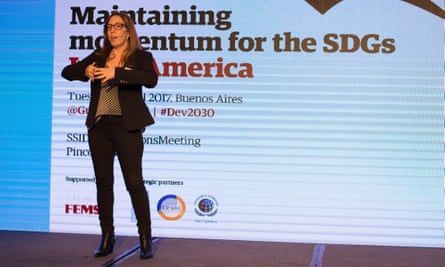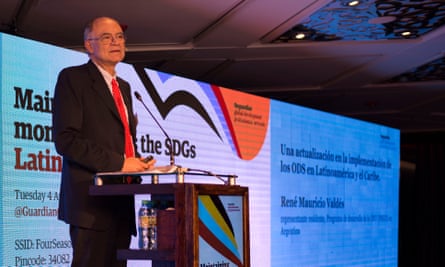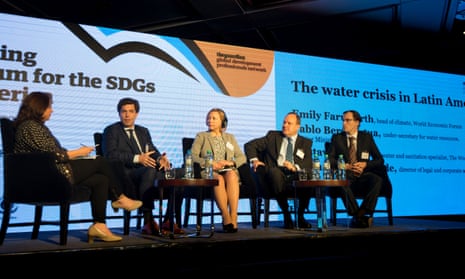The news that more than 200 people were killed in floods and landslides in Colombia formed a sombre backdrop to a panel discussion on Latin America’s water crisis, hosted by the Guardian in Buenos Aires, Argentina on 4 April.
Floods in Colombia and Peru have exposed weaknesses in dealing with emergencies in the region. “We have a double whammy of climate change impacting how we manage water, and not having the planning to respond to environmental changes,” said Emily Farnworth, head of climate at the World Economic Forum.
Though Latin America is home to a third of the world’s freshwater resources, 30 million people are without access to safe drinking water across the region and 100 million still lack access to sanitation. The issue is not supply, it’s management, said Colombia-based journalist Sibylla Brodzinsky, who was chairing the event, Maintaining the Momentum for the SDGs – Latin America.
The water crisis is an institutional problem, due to a long-term lack of prioritisation of infrastructural works, particularly underground water pipes, said Pablo Bereciartua, under-secretary for water resources at Argentina’s interior ministry. The government’s National Water Plan aims to align its policies to the sustainable development goals (SDGs), the minister said, adding: “Argentina has a historic deficit in investment and planning in the water field, which this government set out to solve”.
To address the problem of water management, the World Bank’s Gustavo Saltiel said more must be invested in institutions working towards providing drinking water, and making it sustainable. “The state is the biggest funder here in Argentina and worldwide, but you also need private investment,” he said, adding that he did not mean privatisation of water services. Instead, Saltiel called for a small percentage of private investment to complement the state’s investment. “The issue is that there are no projects, no plans, no safety ... so we need to have private investment: 90% from the government or state; 10% from investors.”

Germán Guillermo Pennimpede, legal and corporate affairs director for Coca Cola at Femsa de Argentina, added that it was not only about the quality of institutions: “The water crisis won’t be solved by throwing money at it. It requires a concerted effort. The education of civil society is key for success in the long term.”
The speakers agreed that community involvement is vital to achieving the SDGs. When it comes to protecting the health of populations across Latin America, particularly from viruses such as Zika, individuals need to take responsibility to protect their community, said Romina Libster, a researcher at Fundacion Infant and the National Scientific and Technical Research Council. “Getting vaccinated isn’t just a right, it’s a responsibility,” she said. “When the pandemics arrive there won’t be borders or nationalities.”
Education is also vital for improving gender equality, added María José Lubertino, a lawyer and professor at the University of Buenos Aires. “If there was more sex education for boys and girls there would be fewer cases of gender violence in the region.”
Latin America suffers from one of the worst rates of femicide in the world, which Lubertino made clear in her opening keynote speech. She also spoke of the power of civil activism – the protest movement #NiUnaMas (not one more women shall be killed) has spread from Argentina across the region.
Lubertino highlighted the importance of increasing the number of women in high-powered jobs. “One woman will not be able to change policies. Changes occur when there are more women,” she said. “If women are not on an equal footing in decision-making places, if we are not 50/50 at highest ranking levels, it’s going to be more difficult to have more equality in the everyday decisions.”

Eric Parrado, from the Regulatory Banking Authority of Chile, underlined the need for gender parity in his discussion on financial inclusion. In the Chilean banking system, there are “seven women in 129 board positions, when women in Chile make up 52% of the population”. Parrado questioned whether this was an “unconscious bias against women” or just blatant discrimination.
It was particularly pertinent that these discussions were taking place on the US equal pay day – the date that signifies roughly how far into the following year women need to work in order to earn as much as men did in 2016. The date varies according to region. For US women to earn as much as their male counterparts did in 2016, they needed to work until April 4, 2017. While Latin America has made important strides when it comes to gender equality and bringing more women into work, the gender pay gap persists, and men can earn up to 17% more than women. Parrado called for a concerted effort to address gender inequality: “Anyone can contribute to closing the gender gap – even a banking authority.”
Parrado spoke of the importance of collecting data to understand the gender pay gap and educate people on this issue – at the very least see that it is a visible problem across the region. He also called for drastic change. “If you follow the current programme to close the gender gap it will take 170 years. I don’t want to wait 170 years. I want to reach the 2030 goal, so we must all contribute – especially men.”
Broadening the discussion on financial inclusion, Brian Forde, director of digital currency at MIT Media Lab, spoke about the power of bitcoin. He said that developing nations “understand the power of this technology and how they could fortify some of the weaker infrastructure they have – whether it be government or finance”, and that “bitcoin adoption will come from the developing world rather than developed world”.

To close the event, the UNDP’s René Mauricio Valdés provided an update on the implementation of the SDGs in Latin America and the Caribbean. He said it “was one of the regions that made the most progress in achieving the millennium development goals”, so the “first task is to protect and avoid the degradation of the goals attained – we have made progress, we have not started from scratch”. Yet despite this progress, as outlined in the discussions on the water crisis and gender inequality, “the improvements that we saw in many areas started to plateau”, Valdes said.
He pointed out there had been much progress in spreading knowledge about the goals across the region, and “there has been a lot of effort made throughout the countries in this direction to create an institutionality, one that can have an interior vision of the agenda”. This vision must recognise the intrinsic relationship between economics and social and environmental issues. Ultimately, to “not leave anyone behind”, the overarching goal of the 2030 agenda, is “the full search for the enjoyment of human rights” Valdes said.
Join our community of development professionals and humanitarians. Follow @GuardianGDP on Twitter.

Comments (…)
Sign in or create your Guardian account to join the discussion